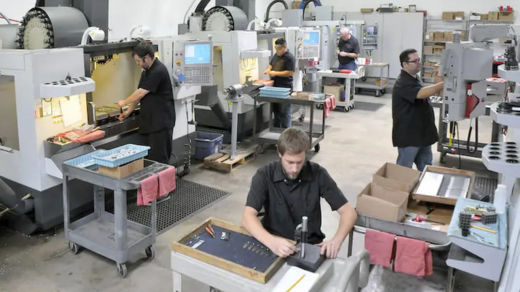Working with high-precision assemblies that combine more than one material isn’t just about tight fits—it’s about keeping everything stable, reliable, and repeatable under real-world demands. Engineers designing for medical, aerospace, or electronics sectors often depend on tolerance zones under one micron, especially when components involve dissimilar metals. Knowing whether a CNC machine shop near me has the capability to deliver those requirements is more than a curiosity—it directly influences product function and longevity.
Tight Control of Material Shift Across Joined Assemblies
Multi-material assemblies challenge machinists to anticipate how components behave once joined. This includes understanding the way stress distributes at interfaces, particularly under thermal cycling or torque. Precision CNC machining services maintain tight dimensional control through specialized fixturing, compensation software, and exact calibration practices. This ensures the integrity of form, fit, and function across the entire product, even in dissimilar interfaces.
Shops equipped with top-tier CNC plasma cutting machine setups use real-time data feedback to detect material deviations during the machining process. This level of insight helps avoid micro-shifts that would otherwise appear after bonding, bolting, or press-fit assembly. The combination of stable machining practices and seasoned understanding of how parts behave after union makes a measurable difference in complex product builds.
Predictable Results Across Aluminum to Stainless Combinations
Mixing aluminum with stainless steel in an assembly often introduces challenges due to different hardness and machining response. A capable CNC machine company can offset this by fine-tuning feeds and speeds for each material section, using tooling suited for both without sacrificing precision. This provides more predictable outcomes and ensures a consistent surface finish across all areas of the part.
Shops that produce repeatable results in these combinations often have a deep understanding of bimetal compatibility, especially in relation to chip removal and tool wear. Combining aluminum’s softness with stainless’s rigidity within a sub-micron tolerance range demands precise coordination of cutting parameters and environmental controls. A reliable CNC machine shop near me must balance these variables while producing high-yield parts.
Stable Finishes in Areas Sensitive to Heat Buildup
Maintaining surface finish becomes critical in assemblies with features like press-fit zones or electronic contacts. CNC plasma cutters generate heat, and in multi-material parts, heat response varies across metals. High-end machining services near me use thermal management strategies such as flood cooling or air blasts to dissipate localized heat and protect finish-sensitive regions.
Precision isn’t only about dimensional tolerances—it also applies to surface quality. Uneven heat buildup during tool passes can alter microstructure or introduce discoloration, especially on softer metals. CNC companies near me that control surface stability during plasma and mechanical cutting processes help preserve downstream performance in heat-sensitive assemblies.
Machinist Familiarity with Dissimilar Thermal Expansion Rates
Machinists experienced with multi-material builds understand how thermal expansion affects assembled parts. Stainless steel and aluminum expand at different rates, and if this isn’t accounted for in machining or design, tolerance stacking occurs. CNC machine shops that account for thermal mismatches during part machining and assembly stage layout can avoid issues once the final product reaches temperature cycling.
This awareness shows up in how jigs are built, how parts are held during milling or plasma cutting, and in post-machining inspection steps. Teams that model expansion behavior in both design and cutting stages reduce costly rework and eliminate unexpected movement in assembled units.
Holding Thread Concentricity When Multiple Inserts Are Required
Threaded inserts are common in hybrid assemblies, especially where metal meets plastic or aluminum meets steel. Maintaining concentricity across all inserts—even if located in different materials—requires tight bore alignment and exact threading depth. CNC companies near me handle this with multi-axis machines that allow precise tool positioning and real-time adjustment for each cavity.
It’s not just about tapping threads. Ensuring the threads stay perfectly aligned across mating surfaces, especially when different materials are involved, prevents mechanical stress and premature failure. Whether inserts are installed via heat-set, press-fit, or threaded locking, CNC machine shop near me must use controlled methods to retain centerline integrity throughout the build.
Seamless Fitment Across Matched Cavities with Mixed Alloys
Complex assemblies often feature cavities that must align perfectly even across dissimilar metals. Matching these surfaces without burrs, gaps, or warping depends on advanced toolpath programming and controlled chip evacuation. Shops using precision machining tools and CNC plasma cutters can build tight-fit cavities that feel seamless, even with alloy differences.
The best results come from machinists who understand how each alloy machines under pressure. For example, magnesium requires delicate engagement, while copper alloys may smear if tooling isn’t sharp enough. By adapting their strategy to each material within the same component, CNC machining services near me can deliver cavity match-ups that support exacting tolerances and repeatability.
Avoiding Edge Warping During Secondary Operations
Parts often undergo finishing steps after machining—anodizing, welding, polishing—and each introduces new thermal or mechanical stress. If the original part wasn’t machined with those future forces in mind, edge warping becomes likely. A competent CNC machine shop near me compensates for this from the beginning, sometimes adjusting machining order or leaving extra stock for final trim passes. Secondary processes, especially involving heat or vibration, can easily push parts out of tolerance. Warped edges compromise fit, especially in sliding or sealed interfaces. Skilled CNC shops predict how parts react during finishing and implement preventive steps like stress relief cycles or revised hold-down strategies to ensure dimensional integrity remains intact.
Holding Micro-tolerances Despite Vibration-prone Setups
Maintaining sub-micron tolerances isn’t only about equipment—it’s about eliminating interference. On long, slender parts or complex geometries, vibrations during machining can cause deviations barely visible to the eye but enough to ruin the build. Experienced CNC companies near me use dampening strategies, custom tooling setups, and tightly secured fixtures to manage vibrations before they become a problem.
Sometimes this means adapting feeds or slowing RPMs. In other cases, it involves adjusting tool approach angles or rebalancing the CNC plasma cutting machine setup. These small refinements help hold micro-tolerances even on parts that would otherwise deflect or resonate under pressure. The payoff is consistency, particularly across batch runs or serialized production, where repeatability is a top priority.


